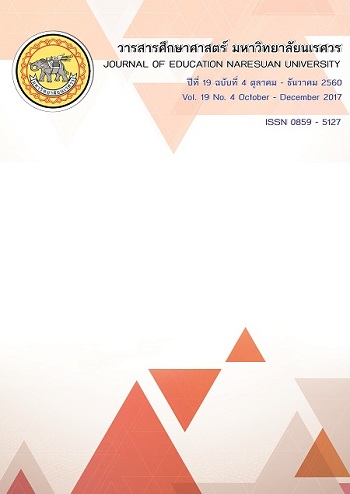การพัฒนารูปแบบระบบช่วยเหลือแบบอัตโนมัติเพื่อส่งเสริมความคิดสร้างสรรค์ โดยใช้ปัญหาเป็นฐานสำหรับกลุ่มวิชาการโปรแกรมคอมพิวเตอร์; THE DEVELOPMENT OF PROBLEM BASED LEARNING AUTOMATIC SUPPORT SYSTEM TO SCAFFOLD CREATIVE THINKING FOR COMPUTER PROGRAMMING ...
Main Article Content
Abstract
งานวิจัยครั้งนี้ มีวัตถุประสงค์เพื่อสังเคราะห์และประเมินความเหมาะสมของรูปแบบระบบช่วยเหลือแบบอัตโนมัติเพื่อส่งเสริมความคิดสร้างสรรค์โดยใช้ปัญหาเป็นฐาน สำหรับกลุ่มวิชาการโปรแกรมคอมพิวเตอร์ มีวิธีการดำเนินงานวิจัย ดังนี้ 1) ศึกษาเอกสารที่เกี่ยวข้อง 2) กำหนดกรอบแนวคิดในการวิจัย 3) การสังเคราะห์รูปแบบผลการดำเนินงานวิจัยสรุปได้ว่า รูปแบบระบบช่วยเหลือแบบอัตโนมัติเพื่อส่งเสริมความคิดสร้างสรรค์โดยใช้ปัญหาเป็นฐาน สำหรับกลุ่มวิชาการโปรแกรมคอมพิวเตอร์ มี 3 ส่วน ดังต่อไปนี้ ส่วนที่ 1 ก่อนเรียน ปฐมนิเทศ ทำแบบทดสอบก่อนเรียน ส่วนที่ 2 ระหว่างเรียน 1) การใช้ปัญหาเป็นฐาน (PBL Module) กิจกรรมการแก้ปัญหาเชิงสร้างสรรค์ ซึ่งแบ่งออกเป็น 5 ขั้น ดังนี้ วิเคราะห์ปัญหา ศึกษาหาความรู้ แลกเปลี่ยนความคิด ขั้นตอนการแก้ปัญหา สรุปภาพรวมปัญหา 2) ส่วนระบบช่วยเหลืออัตโนมัติ ประกอบด้วยองค์ประกอบ ดังนี้ ระบบตรวจสอบการทำงานอัตโนมัติ แลกเปลี่ยนเรียนรู้ แหล่งเรียนรู้ ลิ้งค์ภายนอก ส่วนที่ 3 การประเมินผล ประกอบด้วยการประเมินผลความรู้หลังเรียน และการประเมินผลการปฏิบัติงานของผู้เรียน ผลการประเมินความเหมาะสมรูปแบบระบบช่วยเหลือแบบอัตโนมัติเพื่อส่งเสริมความคิดสร้างสรรค์โดยใช้ปัญหาเป็นฐานสำหรับกลุ่มวิชาโปรแกรมคอมพิวเตอร์ ตามความคิดเห็นของผู้เชี่ยวชาญ 10 คน พบว่า ส่วนก่อนเรียน มีความเหมาะสมอยู่ในระดับมาก โดยมีค่าเฉลี่ย 4.05 ส่วนเบี่ยงเบนมาตรฐาน 0.39 ขั้น PBL Module มีความเหมาะสมอยู่ในระดับมาก โดยมีค่าเฉลี่ย 4.30 ส่วนเบี่ยงเบนมาตรฐาน 0.55 ขั้น Automatic Support System Module มีความเหมาะสมอยู่ในระดับมาก โดยมีค่าเฉลี่ย 4.15 ส่วนเบี่ยงเบนมาตรฐาน 0.59 ขั้น การประเมินผล มีความเหมาะสมอยู่ในระดับมาก โดยมีค่าเฉลี่ย 4.10 ส่วนเบี่ยงเบนมาตรฐาน 0.74 สรุปภาพรวมมีความเหมาะสมอยู่ในระดับมาก โดยมีค่าเฉลี่ย 4.18 ส่วนเบี่ยงเบนมาตรฐาน 0.57
THE DEVELOPMENT OF PROBLEM BASED LEARNING AUTOMATIC SUPPORT SYSTEM TO SCAFFOLD CREATIVE THINKING FOR COMPUTER PROGRAMMING COURSES
The objectives of the research were to synthesize and to evaluate the appropriateness of the problem based learning automatic support system to scaffold creative thinking for computer programming courses. The research procedures were 1) review of the related literature, 2) the scope of the conceptual framework, and 3) synthesize the problem based learning automatic support system to scaffold creative thinking for computer programming courses. The results of the synthesized model revealed, there were 3 stages, stage 1 before studying i.e. orientation and pretest, stage 2 studying have 2 module: 1) PBL Module consisting of 5 problems solving activities (1) problems analysis, (2) issues study, (3) discussions, (4) problems solving, and (5) problems solving overview, 2) Scaffold Module consisting of automatic monitoring system, discussions, learning resources, and external links, and stage 3 evaluation i.e. posttest and evaluation. The research results of the evaluate model can be concluded from the 10 experts’ points of view that the stage of orientation and pretest had high level of appropriateness by a mean of 4.05 and a standard deviation of 0.39. The stage of PBL Module also had high level of appropriateness by a mean of 4.30 and a standard deviation of 0.55. The stage of Scaffold Module had high level of appropriateness by a mean of 4.15 and a standard deviation of 0.59. The stage of evaluation had the high level of appropriateness by a mean of 4.10 and a standard deviation of 0.74. Overall, the results showed the high level of appropriateness by a mean of 4.18 and a standard deviation of 0.57.
Article Details
The owner of the article does not copy or violate any of its copyright. If any copyright infringement occurs or prosecution, in any case, the Editorial Board is not involved in all the rights to the owner of the article to be performed.
References
Edward de Bono. (2010). Think! before it's too late (Netprasert, N., Trans). Bangkok: Nation Book. (in Thai)
E. Paul Torrance. (1969). Guiding creative talent. New Delhi: Prentice-Hall of India Private.
Guilford, J. P. (1967). The nature of human intelligence. McGraw-Hill: Book Company.
Hannafin, M. J. (2010). Resource-based learning environments: Methods and models. Retrieved April 16, 2010, from http://www.ascilite.org.au/conferences/perth97/papers/Hannafin/ Hannafin.html
Khiaosri, S. (2007). Development of a scaffolding web-based inquiry model for science subject to develop problem solving skills of lower secondary school students (Doctoral dissertation). Bangkok: Chulalongkorn University. (in Thai)
Limcharoen, S. (2009). The extra-curriculum development enhancing creativity thinking in second-level students (Doctoral dissertation). Bangkok: Srinakharinwirot University. (in Thai)
Moonkham, S., & Moonkham, O. (2007). 21 Methods for development of learning and skill. Bangkok: Parbpim. (in Thai)
Moonkham, S. (2009). Context of modern thinking (10th ed.). Bangkok: Parbpim. (in Thai)
Page Larkin, M. J. (2001). Providing support for student independence through scaffolded instruction. TEACHING Exceptional Children, 34(1), 30-34.
Poungthong. (2013). Enhance mathematical connection cluster competency by using problem-based learning activities in the topic of trigonometry ratio for Mathayomsuksa 5 students (Independent study). Phitsanulok: Naresuan University. (in Thai)
Silasukonth, K. (2007). Rubrics or scoring rubrics. Bangkok: Bureau of Academic Affairs and Educational Standards. (in Thai)
Tapprasan, S. (2010). The synthesis of a model of blended learning using collaborative learning techniques with Scaffold System (Doctoral dissertation). Bangkok: King Mongkut's University of Technology North Bangkok. (in Thai)
Techacupt, P., Yindeesuk, P., & Meesri, R. (2010). Teaching for thinking: Integrated learning project (2nd ed.). Bangkok: Chulalongkorn University. (in Thai)
Teemueangsai, S. (2009). Collaborative problem-based learning development with scaffolding via computer network (Doctoral dissertation). Bangkok: King Mongkut's University of Technology North Bangkok. (in Thai)


